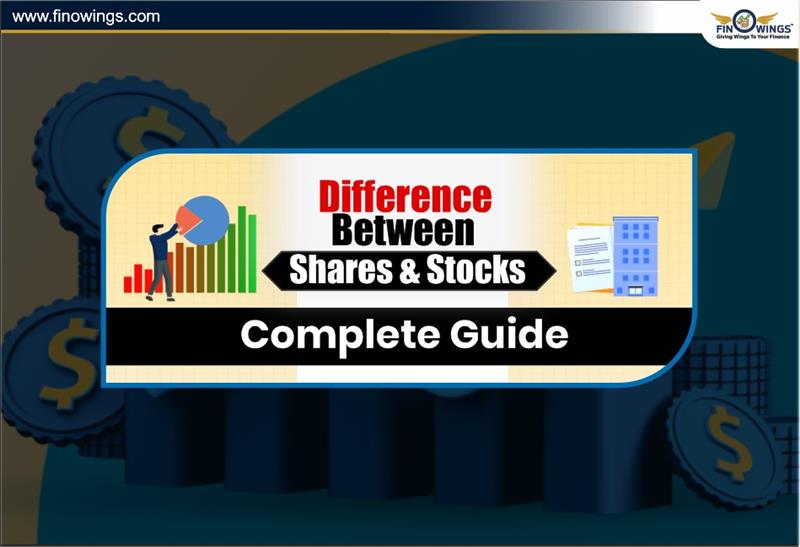Home >> Blog >> Difference Between Shares and Stocks - Complete Guide
Difference Between Shares and Stocks - Complete Guide

Table of Contents
- Importance of Understanding Shares vs Stocks
- 1. What Are Shares?
- 2. What Are Stocks?
- 3. Shares Vs Stocks: The Real Difference
- What is Share Market And Stock Market?
- What are the Reasons that Companies Issue Shares?
- Shares and Stocks: What is the Importance to the Investors?
- Misconceptions about Stocks
- Which Term Should You Use?
- Final Thoughts
Starting to understand the investing world means understanding the basics first, and one of the most common beginner confusions is the difference between stocks and shares. These terms are often used interchangeably, but actually have a distinct difference. As a beginner investor wanting to understand the difference between shares and stocks and wanting to clarify what the share market is and what the stock market is, this guide is meant to clarify everything.
In this complete explanation of stock vs share, you will learn the definition, difference, an example.
Importance of Understanding Shares vs Stocks
Fundamentals are everything when starting your investing journey. Most beginner investors just assume shares and stocks are the same. Although they are interrelated, knowing the difference between stock and shares will help you:
-
Read and understand financial news better and more accurately.
-
Make more informed and better financial decisions with investing.
-
Understand the analysts of the market when they are using terminology.
-
Understand how companies finance and fundraise.
1. What Are Shares?
In answering the question What are Shares?, let's picture a large company broken down into lots of tiny pieces of ownership. Each of these pieces is called a share. When you purchase a share of a company, you own a tiny bit of that company.
Key Points About Shares
A single share correlates to one specific company.
-
If a company has 1 crore shares and you purchase 1, then you own a tiny piece of that company.
-
There are certain rights pertaining to shares, such as voting rights, dividends, and other benefits of ownership.
Example- When you purchase some shares of Reliance Industries, you own some small pieces of that specific company. Indeed, shares are like slices of a pizza - each slice is from the same pizza.
2. What Are Stocks?
In trying to understand the question What are Stocks?, you may think of the word "stocks" as the wider term that refers to ownership in one or more companies opposed to just "Shares".
Key Points About Stocks
-
Stocks are more of a term that describes ownership in any one company in particular.
-
When one says "I invest in stocks", they are referring to investing in a wide variety of companies.
-
Stocks refer to the collection of shares that one has from different companies. Example- If you possess 5 shares of Infosys, 10 shares of TCS, and 15 shares of HDFC Bank, all of these together comprise your stocks.
-
Thus, while shares are portions of the same pizza, stocks are an assortment of portions from different pizzas.
3. Shares Vs Stocks: The Real Difference
Here is the most straightforward explanation of the difference between shares and stocks:
|
Basis |
Shares |
Stocks |
|
Meaning |
Ownership in a single company |
Ownership in multiple companies |
|
Usage |
Specific |
General |
|
Example |
10 shares of Tata Motors |
Your entire investment portfolio |
|
Nature |
Precise term |
Broad term |
|
Quantity |
Measured in the number of shares |
Measured as a group of holdings |
In simple words:
Shares - Specific units of a company
Stocks - Total collection of shares you own in the market
What is Share Market And Stock Market?
Another common confusion investors face is knowing what is share market and stock market.
Share Market
A share market is a market where we buy or sell stocks of certain companies.
For example:
ITC or SBI are companies whose stock can be traded in NSE and BSE which are stock exchanges.
Stock Market
A stock market is an entire ecosystem where various financial securities can be traded. This includes:
-
Company Shares.
-
Bonds.
-
Exchange Traded Funds (ETFs).
-
Derivatives.
-
Units of a Mutual Fund.
Though the terms are used interchangeably, “stock market” is a wider term since it includes even more instruments.
What are the Reasons that Companies Issue Shares?
There are many reasons that companies issue shares:
1. Fundraising
A company can raise the required amount of money for:
-
Expansion of the business.
-
Undertaking new projects.
-
Paying off existing debts.
2. Ownership Distribution
Investors can become partial owners of the company.
3. Improved Reliability
Investors tend to put trust in publicly traded companies and are more likely to invest.
Shares and Stocks: What is the Importance to the Investors?
Buying decisions, reviewing annual reports, and finance-related news are all made easier with the knowledge of shares vs stocks.
A. At The Time Of Purchase
You purchase shares of a company. Thus, you become a partial owner of that business. This also means the control of the business in a small fraction is with you.
B. While Having Wealth
As time goes on, your stock portfolio expands as you acquire stock in multiple companies.
C. When Diversifying
Stocks are your entire portfolio for investments, thus making it easier.
D. While Knowing Risk
Risk is attached to the single stock and to the stock portfolio as a whole.
Misconceptions about Stocks
-
There is no difference between stock and shares
Stock simply refers to the bundle of a company's ownership you hold, while shares are the components of a single company's equity.
-
Investing in stocks is something only professionals do
People at any level of wealth in society are free to start stock investing and even trade with very little capital.
-
It is not true that the stock market is a game of chance.
Investing is not based on chance when a person fully understands the market and employs self-control.
Which Term Should You Use?
In both grammar and speech, the choice of which of the two terms to use is random in India. But when addressing a single company say shares. When addressing the market in general, or the whole of your portfolio say stocks.
Example:
"I purchased 20 shares of Infosys."
"I trade stocks."
Final Thoughts
Every beginner must know the difference between stocks and shares.This allows for correct and precise communication, increasing the ability to make savvy investment decisions while gaining a better understanding of the mechanics of financial markets. Learning what shares, stocks, or even the terms share market and stock market has to offer feels less challenging once the knowledge is simplified.
You own a piece of a company, while you own stocks. Both are vital to growing wealth and achieving financial growth over the long haul. Being a new investor, your investment journey will be far more advanced once you grasp these rudiments. Increasing your confidence while harnessing these concepts will greatly affect how you navigate the market. Knowing the difference between stocks and shares will contribute to all the previously mentioned advantages.
DISCLAIMER: This blog is NOT any buy or sell recommendation. No investment or trading advice is given. The content is purely for educational and information purposes only. Always consult your eligible financial advisor for investment-related decisions.
Author
Frequently Asked Questions
Shares represent ownership in a single specific company, while stocks refer to your entire collection of shares across different companies. Example: 10 shares of Reliance = shares; your entire portfolio (Reliance + TCS + HDFC Bank) = stocks.
In India, people casually use both terms to mean the same thing. But technically, “shares” are precise units of ownership in one company, whereas “stocks” describe your overall investment holdings. Using the correct term helps you understand news, data, and market analysis better.
The share market is where shares of specific companies are bought and sold—like NSE or BSE.
The stock market is a wider ecosystem where many financial instruments are traded, including shares, ETFs, bonds, and derivatives. The stock market is a broader term than share market.
Companies issue shares mainly to raise money for expansion, new projects, debt repayment, or diversification. Issuing shares also helps distribute ownership, increases credibility, and attracts more investors to the business.
Understanding the difference helps beginners read financial news correctly, understand company reports, make smarter investment decisions, diversify portfolios, and judge risks accurately. It also improves clarity when learning how markets work.




















